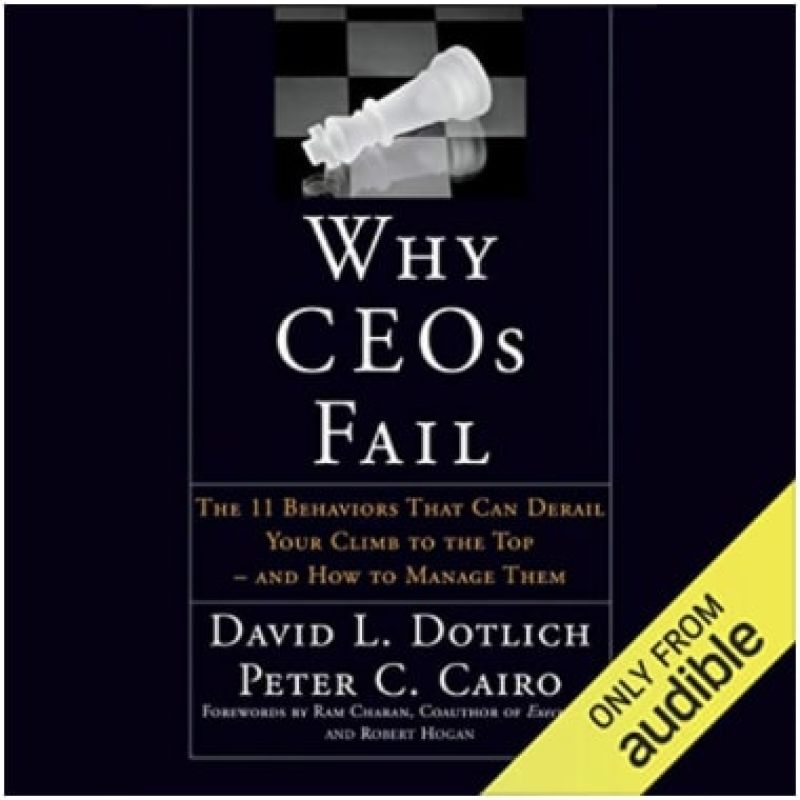
Why CEOs Fail – the 11 behaviours that can derail your climb to the top end and how to manage them.
This is an invaluable book and one I use with the Hogan HDS Psychometric a lot as Your CEO’s trusted leadership coach. All too often we all, myself included, have Dark-side elements to our strong personalities that can be the source of our failures and our de-railing experiences. Sometimes this can lead to the dark triad: Machiavellianism, Psychopathy and Narcissism – as shown by political leaders like Vladimir Putin, Donald Trump, Silvio Berlsuconi and Boris Johnson.
These are the personal risk factors that we have to mitigate – we are so good having risk registers for a business and financial risk management approaches. However, we rarely do anything to have a risk register for ourselves, our CEOs and leadership team members. You only need to think of infamous characters like Dick Fuld the fateful CEO of Lehman Brothers. His high risk personal behaviours caused his clash with Hank Paulson at the Fed and led to the demise of Lehman Brothers and the Global Collapse in 2008 of the financial markets. Fuld seems to have learnt little and now runs Matrix Private Capital, which offers investment advice to “high-net-worth” clients.
The Guardian Newspaper said: Fuld ran Lehman for 14 years before the bank collapsed and was paid about $500m over the last eight years of that period. The man nicknamed “the gorilla” has repeatedly blame the government, regulators and unfounded rumours for Leyman’s death, while admitting few mistakes. The bank’s staff, however, blamed the Gorilla and in a grilling on Capitol Hill a congressman described him as “the villain”.
Look again at UK Prime Minister Liz Truss and Chancellor Kwasi Kwarteng and how their “bold” (a specific category in Hogan’s psychometric), high-risk behaviour has led to their arrogance that they’re right and everybody else is wrong and the immediate market collapse that followed their volatility.
It is risky to be a CEO of a corporation today. The average tenure of CEOs and major companies is growing increasingly short.
The news media is filled with stories of fallen idols. CEOs have gone from a list of “most admired” to those of least trusted. What happens when such clear talented leaders also make poor decisions, alienate care people, miss opportunities, and ignore trends and developments? What lessons can every day leaders who aspire to be effective and move up within an organisation learn from the failures of those at the top? The book draws on researching real stories based on the authors experience and describe 11 do rain is that can impact judgement and lead to business and career problems, even failures. They show how leaders who aspire to be successful can learn to identify your shadow side of your personality and take steps to control your impulses and increase your effectiveness and impact. Using a variety of tools and techniques based on coaching CEOs there are specific steps to help you identify your own derailleurs and simple practical methods that can lead to you managing yourselves effectively.
You also need to listen to “The Revenge of Power” by Moises Naim who talk about 3P leaders: who use populism, polarisation and post-truth (lying) strategies.
The 11 Categories you should check yourself against (see Hogan):
- Arrogance: you’re right and everybody else is wrong (bold)
- Melodrama: you always grab the centre of attention (colourful)
- Volatility: your mood shifts are sudden and unpredictable (excitable)
- Excessive caution: the next decision you make maybe your first (cautious)
- Habitual distrust: you focus on the negatives (sceptical)
- Aloofness: you disengage and disconnect (reserved)
- Mischievousness: you know that rules are only suggestions (mischievous)
- Eccentricity: it’s fun to be different just for the sake of it (imaginative)
- Passive resistance: your silence is misinterpreted as agreements (leisurely)
- Perfectionism: you get the little things right, while the big things go wrong (diligent)
- Eagerness to please: you want to win any popularity contest (dutiful)